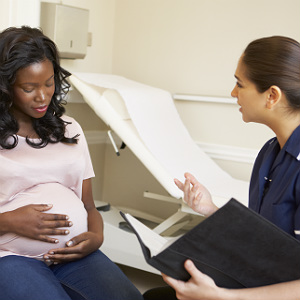According to the US Office on Women’s Health, more than 20 million Americans are currently infected with genital Human papillomavirus (HPV), the most common sexually-transmitted disease (STD). In fact, more than half of all women will get HPV at some time during the years in which they can safely get pregnant.
Is Having An STD Dangerous For Pregnant Women?
Sexually-transmitted diseases are surprisingly common. But most of them are also “silent”: you won’t notice any symptoms and they won’t negatively affect your overall health. For example, the Centers for Disease Control & Prevention reports that nearly 90% of chlamydial infections do not present any outward signs. Getting tested, or “screened,” is often the only way you’ll know.
 Having an STD can cause serious pregnancy complications. But even with the astonishing prevalence of sexually-transmitted diseases, prenatal doctors are not required to screen pregnant women. Some do as a matter of course, some don’t. Others will only test for certain diseases, leaving others (ones you might actually have) out.
Having an STD can cause serious pregnancy complications. But even with the astonishing prevalence of sexually-transmitted diseases, prenatal doctors are not required to screen pregnant women. Some do as a matter of course, some don’t. Others will only test for certain diseases, leaving others (ones you might actually have) out.
If you have a doctor right now, ask to be tested for every STD at your first prenatal appointment. If you haven’t connected with a doctor yet, or you don’t have health insurance, read our blog “What Can I Do If I’m Pregnant But Don’t Have Health Insurance?” here to find out how to get care.
In this guide, we’ll cover the most common sexually-transmitted diseases, along with the pregnancy complications they can cause.
Human Papillomavirus (HPV)
As we mentioned above, lots of women have HPV, and many more will be infected during their lives. For most, the virus will simply go away without causing any problems. In limited cases, HPV can result in genital warts, which look like small bumps surrounding the vagina.
How Can HPV Affect My Baby?
If those genital warts are large or spread out, they can block your birth canal, making delivery difficult. In this situation, a cesarean section may be recommended.
HPV can be spread to a baby, but not in its original form. Instead, some newborn babies (this is very rare) have developed laryngeal papillomatosis, a non-cancerous growth in the voice box, because their mothers had HPV.
Those are the two complications associated with HPV. HPV’s biggest danger is that it can cause cervical cancer, which usually develops years after you’re first infected.
Chlamydia
Chlamydia is a bacterial infection (not a virus, like HPV) that usually doesn’t present symptoms. If it does, pregnant women may experience vaginal discharge, burning during urination, or bleeding after sex. Unlike HPV, Chlamydia can have serious consequences for your unborn baby.
How Can Chlamydia Affect My Baby?
Chlamydia has been linked to:
- low birth weight
- premature rupture of the membranes (your “water breaking” too early)
- premature labor
Any one of these complications can endanger the life of your baby. Newborns can also be infected during deliver, as they pass through your birth canal. These infections usually affect their eyes or pneumonia in their lungs. If chlamydia is discovered before you come to term, it can be easily and effectively treated with antibiotics.
Gonorrhea
Gonorrhea usually has the same symptoms as chlamydia: vaginal discharge, burning during urination, and abnormal bleeding.
How Can Gonorrhea Affect My Baby?
When left untreated, gonorrhea has been linked to:
- miscarriage
- premature birth
- premature rupture of the membranes
It can also infect the fluid surrounding your baby in the womb. Like chlamydia, gonorrhea can be passed to your baby during delivery, usually resulting in eye infections. Antibiotics are generally the most effective method of treating gonorrhea.
Syphilis
Syphilis usually causes painless sores that break out around the vagina, but can also appear around the anus, mouth, and lips. As the STD progresses, you can develop a body rash, but it won’t itch. In late stages, syphilis can cause paralysis, disabled coordination, blindness, and dementia. Most people don’t reach those late stages, but if you do it’s extremely serious.
How Can Syphilis Affect My Baby?
Syphilis can be passed from an infected mother to her baby. It can cause:
- premature birth
- still birth
- low birth weight
Most babies born with syphilis do not have symptoms early on. After several weeks, they can develop serious disorders of the brain, eyes, and many other organs. Deafness, blindness, and seizure disorders have all been linked to syphilis infections contracted at birth.
Syphilis can be cured with antibiotics.
Human Immunodeficiency Virus (HIV)
HIV is the virus that causes acquired immune deficiency syndrome (AIDS), by killing the cells that allow your body to fight diseases. HIV can be passed to a baby during pregnancy, delivery, and breastfeeding.
How Can HIV Affect My Baby?
Babies born with HIV can develop AIDS, just like adults. In newborns, the virus can cause:
- diminished physical growth
- brain disorders that cause seizures and difficulty walking
- higher frequency of common childhood infections, like ear infections and colds
If HIV is caught during pregnancy, effective treatment can lower the likelihood of passing the infection to your baby to 2%.
Hepatitis
Hepatitis is a virus that infects the liver, and can lead to liver cancer or other chronic diseases. It can be passed to your baby, although the risk of this is relatively low.
How Can Hepatitis Affect My Baby?
Infection with Hepatitis C has been linked to:
- low birth weight
- premature birth
but most infected babies don’t show any symptoms and the infection clears up on its own. Babies infected with Hepatitis B can develop liver cancer, and one in four will die from a chronic liver disease eventually.
Hepatitis is diagnosed after a blood test and can be effectively treated using medications.
Herpes
One out of every six people between the ages of 14 and 49 currently have genital herpes. Herpes doesn’t usually present symptoms. When it does, the infection causes small blisters around the genitals or mouth. This outbreak is often accompanied by a fever and bodily aches. The blisters, or sores, contain a fluid that can transmit the virus to your baby.
How Can Herpes Affect My Baby?
Herpes can be transmitted during pregnancy, but most cases in newborns are caused while passing through an infected mother’s birth canal. Cesarean section is almost always recommended for mothers with active genital herpes sores. The virus has been linked to serious pregnancy complications like:
- premature delivery
- miscarriage
Babies born with the virus can develop neonatal herpes, an infection that causes death in 25% of cases.
Antiviral drugs can be used to effectively treat herpes.
Prenatal Screening Is Essential
Here’s what you should take away from this article:
- STDs can be extremely dangerous for pregnant women and babies, but
- Most can be treated fully if they are noticed in time. Unfortunately,
- Many STDs do not usually cause any symptoms, which means that
- Thorough screening is necessary.
Please speak with your doctor about receiving a comprehensive STD screening as soon as possible.





Leave A Comment